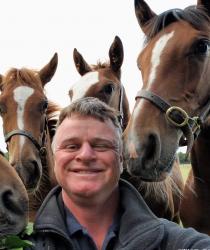
For a resolutely urban boy, Ben Thompson was quick to embrace his new rural surroundings when he arrived at Dunhurst from London. Ben’s mother had just accepted a post as a dance teacher at the school, joining her husband, who was to teach the trumpet to Bedalians for many years, on the staff. “Everything tied in quite nicely,” Ben recalls. “I shook off London in no time; my parents bought me a bicycle to go exploring and I remember Dunhurst as a purely happy experience. So many teachers of the highest quality helped to make it so – Joan in The Barn, Angela Weeks, Lester Knights, who was in charge of the junior chisels, among so many others.”
From Dunhurst, Ben left to spend some years at Bohunt School in Liphook before returning to Bedales in the sixth form. He arrived with mixed emotions. “To a degree, Bohunt had given me a different window on the world, one which clashed with what I now found,” Ben explains. “I didn’t dislike it at all but as a local day student, I did find it a bit harder to identify with some of my peers, most with backgrounds so vastly different from mine. It wasn’t that I encountered snobbery; more that it was harder for me to make the right connections with my fellow students. Perhaps as a result of that, I adored Steep, which became a magical place to me. The walks, Stoner Hill, the nature, the great outdoors – these are what stay with me to the present day.”
On an educational level, Ben had also found an environment in which he could thrive. “I was lucky enough to be taught by people of the calibre of Jonathan Willcocks, John Batstone and the late David Butcher, wonderful teachers who were just as exceptional as life mentors,” he says. “David in particular was relentlessly positive, almost never got upset and imparted lessons that I’ve been able to carry through life. Even today, the smell of pipe tobacco is enough to transport me back to David’s workshop.”
“We were always taught that high standards and originality were normal,” Ben continues, “and because of the calibre of teaching, high standards were regularly achieved. Brilliance was always loitering in our immediate sight, earshot and general environment, whether it be the artwork adorning the walls, the ambitious designs of metal and wood, the news that another x students had achieved Oxbridge qualification, the writings that were read aloud, the concerts that were heard, the distant noises of hammer and saw from the barn, the presence of the magnificent library or even just the quality of apples from the orchard.”
A constant thread running through Ben’s school days had always been music, specifically his devotion to the French horn, on which he developed great expertise. “It was massively important to me,” he acknowledges. “For some time, I had the idea in my head that I wanted to be the principal horn player somewhere like the LSO. Reality bit when I left Bedales and joined Trinity College of Music in London – this was going to be a numbers game. There were only so many orchestras going around; there would be far more talented French horn players looking to get on than there were vacancies to be filled. The places that were available were reserved for the truly gifted: the Barry Tuckwells and Michael Thompsons of this world. I was good but I wasn’t the special one. Interestingly, though, I do remember coming back in about 1993-4 to play with Melanie Fuller in the Lupton Hall. It was the Poulenc Sonata for horn and piano on a Parents’ Day or an Open Day, one or the other. It was also without doubt the best I had ever played. It was probably my proudest moment on the horn, the fact that I pulled off a difficult piece in such a fashion. I don’t think that it was coincidence that I produced my finest performance at Bedales for Bedalians.”
We were always taught that high standards and originality were normal
A chance meeting with someone in a similar position to himself both confirmed Ben’s view of his own musical status and gave him the inspiration to embark on the next phase of his life. “I was playing the horn from time to time in a lot of different places and happened to get talking to an RAF musician,” he relates. “He was a damn good player; speaking to him made me realise the difference between playing music and being a professional musician. I had no intention of existing in a London bedsit for ten years, scraping a living by playing music that I wouldn’t generally like. On the other hand, I could see that there were other career opportunities where music would be a central part of the job description.”
So it was that Ben joined the world of HM Band of The Grenadier Guards. Alongside the basic training and infantry soldiering in places as far-flung as Japan and Korea, Ben now spent four years playing the French horn at everything from supermarket openings to Trooping the Colour. “It was by far the best experience that I could have enjoyed at the time,” he asserts, “and my spell of military life remains one of the things that I’ve done of which I’m proudest.”
Ben’s spell in Japan with his regiment had proved to be a particularly influential one: “The order, gentleness and politeness of Japanese society had left a huge impression on me,” he agrees. On leaving the army, Ben returned to the country, initially as an English teacher. “I started by working for others and after a year, I went solo,” he says. “A lot of my pupils tended to be Japanese housewives, who would tell me fairy stories and talk about their families in English. In return, I would give them an idea of how accurate they had been – it was great.”
In 1995, however, the devastating Kobe earthquake left parts of Japan badly in need of new construction work, as well as a workforce to supply it. Enter Ben, radiating memories of his days with David Butcher: “I’d always been reasonably handy at the old dovetails and tenons; I now met an Irish guy who persuaded me that there was loads of work for anyone with the right sort of knowledge. He wasn’t wrong, so I became a carpenter.” Ben’s days were now divided between hard physical work and conversing in broken Japanese with a Mongolian friend about their joint plan to cross Mongolia on a bicycle. “Strangely enough, it didn’t seem such a crazy idea at the time,” Ben reflects.
Japan had cast its spell so deeply over Ben that he might have remained there indefinitely, had due payment for his carpentry not vanished, along with his Irish colleague. “High and dry, without cash, the only immediate solution was to return to the UK,” he remembers. Cycle couriering became Ben’s new business, all the better to prepare for a Mongolian adventure that was far from dead in his mind. “I spent a fair bit of time in the map room at the Royal Geographical Society, poring over these old 1950 maps and planning a cycle route from The Altai Mountains and Lake Hovsgol to the swamps of Mongolia’s eastern extremities,” he says.
The trip itself, despites its many difficulties was “one of those experiences you wouldn’t have missed for the world,” in Ben’s words. “It was joyless at times – I had the runs for six months straight – and I would put my head down with nothing in view but sky, grass and hills, knowing that I could expect more of the same the next day. There was the compensation of meeting real people, though. On several mornings, I would wake up to find Mongolian herdsmen staring at me, who were plainly as surprised to see me as I was to be confronted by them. I was often invited back to a yurt for breakfast, which is the kind of hospitality and interaction with others that you don’t find too often.”
Not long afterwards, Ben was off again, this time riding from North to South across Poland and through the Tatra Mountains. Intrepid though it was, these escapades were not paying the bills. “I thought it was about time I got myself a proper job,” Ben admits. It was now back to Hampshire, where, around a decade ago, he began working for a Thoroughbred Stud farm in Winchester, exulting in the job title of stallionman. Once again, it was a path that harked back to his Bedales days. “It’s funny how things connect up,” Ben observes. “I had done a lot of riding while I was up at Bedales and now here I was doing something with an equine connection. I was more a stallionman without portfolio, in any case. Not long ago, our stallion was sent away to Wales, having not been as proficient at his task as had been hoped. It was a good moment to take stock and think about what I wanted to do with the rest of my life.”
The answer to that looks to be a more serene, peaceful one than has often been the case at moments of Ben’s tumultuous life. “It’s not completely certain yet, but it looks as though becoming a primary school teacher will be where I go next,” he says. “To be honest, my main preoccupation is to be a doting, loving father to my eight year-old son, Jack. I’m enjoying the rural life, I’ve made my home down here and I’m happy. Professionally, though, if I were somehow to become a primary school head teacher one day, maybe even at Dunannie, that would seem to be a very satisfactory way of closing the circle of my life.”
Ben Thompson was interviewed by James Fairweather in September 2014.
